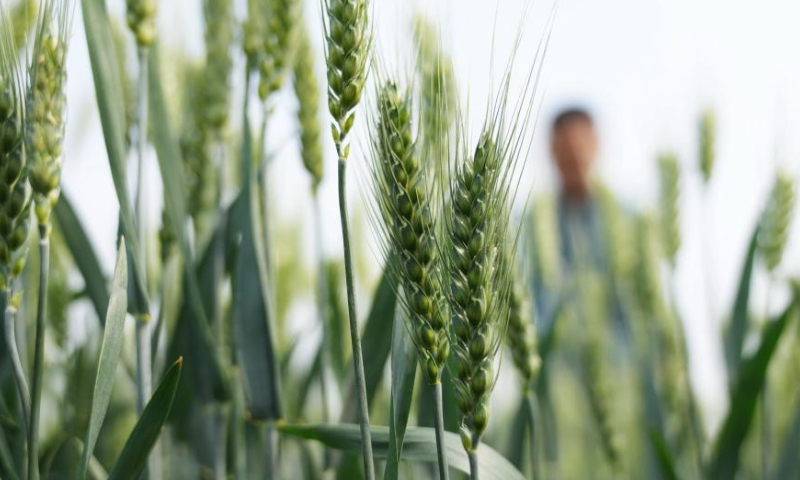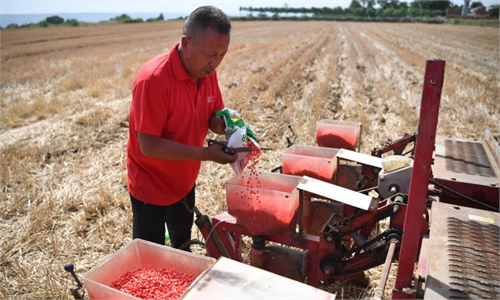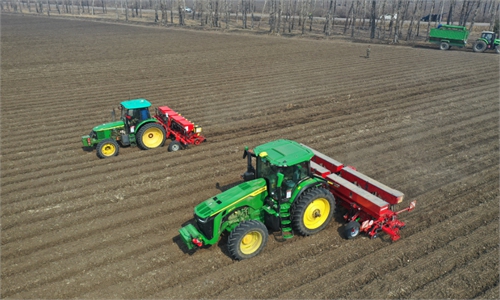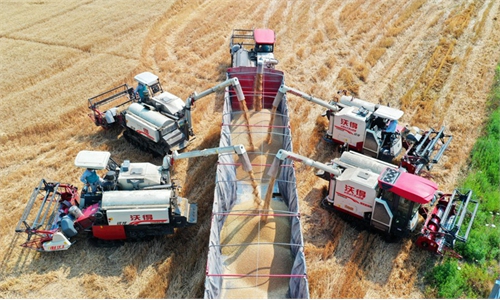
Photo taken on May 10, 2022 shows wheat crops in the fields in Shenze County, north China's Hebei Province. (Xinhua/Yang Shiyao)
As typhoon Chaba makes landfall in South China's Guangxi Zhuang Autonomous Region and Guangdong Province, local farmers are rushing to harvest early-season rice, while reinforcing agricultural land to reduce damage. So far, there has only been limited impact on harvesting activities and measures are underway to reduce losses, farmers said on Sunday.
In spite of a complex and challenging international environment that has led to soaring grain prices, China is able to ensure domestic grain security given an increase in overall planting area and sufficient inventory, one expert said.
"The typhoon has done little damage to local agriculture so far, and the harvest volume for summer grain reached higher level year-on-year," a farmer from Lianqiang farming and livestock cooperative agency located in Baise, Guangxi, told the Global Times on Sunday.
He said that occasional heavy rain and strong wind may have some impact on tropical fruits like mango, but they have built extra supports for trees, production facilities and working to ensure the rain water can be drained immediately.
However, a representative surnamed Liu from Jinhong agricultural cooperative that plants rice in Shantou, Guangdong told the Global Times on Sunday that due to heavy rains caused by the typhoon, only 10 percent of his grain crop had been harvested so far.
"In order to reduce loss as much as possible, our workers have started to work overtime ahead of the typhoon to get the crops in," Liu said, noting that they have piled the harvested rice in a dry warehouse to avoid rot.
The typhoon came as more than 866,000 hectares of early-season rice has entered harvest season in Guangdong, according to the provincial Department of Agriculture and Rural Affairs.
On Saturday, the Ministry of Agriculture and Rural Affairs (MOA) rapidly moved to deploy measures against the typhoon, urging local government departments to minimize damage brought about by the typhoon and ensure that production can rapidly be resumed.
The MOA urged to immediately boost harvest early-season rice, while reinforcing fruit trees, greenhouses and chicken coops and pigsties so as to reduce potential loss. In addition, the ministry said that the adjustment and transport of production materials such as seeds, fertilizers and pesticides will be carried out to meet the needs of post-disaster production recovery.
"Typhoon only affects grain production in partial areas in southern China and will not result in large-scale reduction in output," Jiao Shanwei, editor-in-chief of industry news website cngrain.com, told the Global Times on Sunday.
China increased early-season rice planting area this year, and therefore the overall domestic supply of rice is guaranteed, Jiao said.
A State Council meeting held on June 22 stated that a bumper harvest of summer wheat has been secured this year, which is of a better quality than in previous years. Yields of coarse cereals and common beans registered modest growth, and the output of canola seeds had risen notably.
Premier Li Keqiang said at the meeting that ensuring stable and higher grain output is a key measure to keep prices stable and enhance China's capacity for food security, and it is also conducive to the stability of the global grain market.
China has placed great importance on food production and security in recent years with its grain output stabilizing at over 650 billion kilograms for seven years in a row. This year, the country has pledged to keep grain output above the level too.
"China has established sound grain inventory system and emergency support system to meet people's needs when it is necessary," Jiao said, noting that the country has sufficient wheat and rice inventory that can meet domestic needs for a full year.



